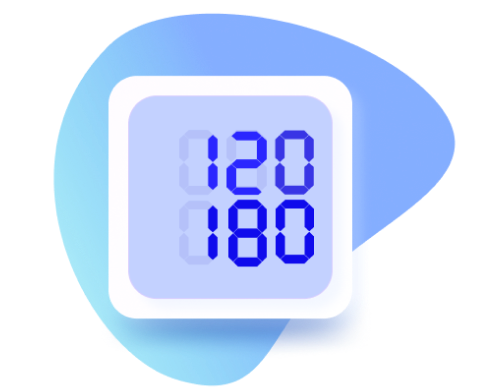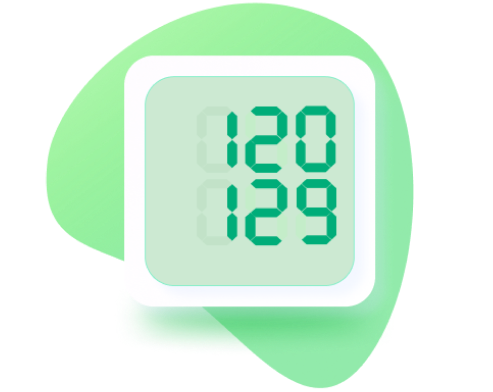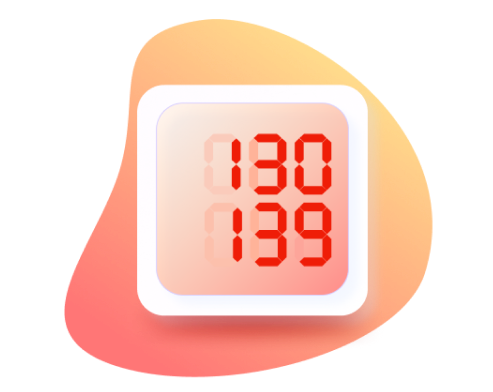
Risk Factors
Blood pressure
What is hypertension or high blood pressure?
- Blood pressure is recorded with two numbers – systolic and diastolic. Blood pressure readings are expressed in millimeters of mercury, which is abbreviated as mm Hg.
- Systolic is the higher of the two numbers. It measures the pressure in the arteries when the heart beats (when the heart muscle contracts).
- Diastolic is the lower of the two numbers. It measures the pressure in the arteries when the heart is resting between heart beats.
- High blood pressure, also known as hypertension can be primary (not due to another disease or medical condition) or secondary (high blood pressure caused by a disease).

systolic less than 120 mm Hg and
diastolic less than 80 mm Hg

systolic 120 to 129 mm Hg and/or
diastolic 80 to 84 mm Hg

systolic 130 to 139 mm Hg and/or
diastolic 85 to 89 mm Hg
Systolic 140 to 159 mm Hg and/or diastolic 90 to 99 mm Hg
Systolic 160 to 179 mm Hg and/or diastolic 100 to 109 mm Hg
Systolic 180 mm Hg or higher and/or diastolic 110 mm Hg or higher
Isolated systolic hypertension: systolic higher than 139 mm Hg and diastolic less than 90 mm Hg
Reference: 2018 European Society of Cardiology/European Society of Hypertension arterial hypertension Guidelines. *Note that the European guidelines differ from the American Heart association
Depending on your age, it is recommended that you keep
your blood pressure within the following levels
When and how can I measure my blood pressure?
- Many pharmacies measure blood pressure for free. A diagnosis of high blood pressure must be confirmed with a qualified health care professional.
- You can ask for your General Practitioner (GP) or General Practitioner nurse to measure your blood pressure.
- You can buy a monitor to measure your blood pressure yourself at home. A diagnosis of high blood pressure must be confirmed with a qualified health care professional. During the COVID-19 pandemic, self-monitoring of blood pressure has become increasingly important due to quarantine and lockdowns, when access to screening and other routine medical care services have been reduced. Click here for instructions on how to monitor your blood pressure at home.
Why is high blood pressure important?
High blood pressure is linked with several negative health outcomes. Therefore, it is important to try keep your blood pressure within the recommended targets. High blood pressure often does not cause any symptoms unless it is extremely high (a hypertensive crisis)but it can damage blood vessels and organs without you knowing.
Unmanaged hypertension can increased your risk several medical conditions including (but not limited to):
- Heart disease, heart attacks, and heart failure
- Strokes and aneurysms
- Kidney disease
- Vision problems and loss of vision
- Vascular dementia

High blood pressure and COVID-19
The COVID-19 pandemic is an ongoing problem and experts are still researching the link between blood pressure and COVID-19. The research field is constantly changing but the latest evidence suggests.
- Individuals with preexisting hypertension (this refers to high blood pressure that existed before the onset of COVID-19) have a higher risk of severe COVID-19, especially in older individuals (Lippi et al)
- People with hypertension and multimorbidity (multiple diseases at the same time) have a higher risk of severe COVID-19 and death, especially older men
The importance of multimorbidity
Multimorbidity is when an individual has several medical conditions co-occurring at the same time. It is common for people with multimorbidity to have hypertension. Multimorbidity is an important health condition because it is linked to several negative outcomes.
For example, people with multimorbidity are more likely to be prescribed multiple drugs, also knowns as “polypharmacy”, and a risk of adverse drug reactions. They also have a higher risk of death and hospitalizations. Multimorbidity is common in older age groups (people over the age of 65 years).
Secondary hypertension: Health conditions that can cause hypertension.
Some people have blood pressure due to another underlying medical condition, doctors call this secondary hypertension. In these cases, blood pressure should be managed by your health care professional. The following conditions can cause secondary hypertension:
- Chronic kidney disease
- Diabetes mellitus
- Certain cancers such as pheochromocytoma
- Cushing syndrome
- Congenital adrenal hyperplasia
- Overactive thyroid (also known as hyperthyroidism)
- Pregnancy
- Sleep apnea
- Obesity
Management and prevention of high blood pressure during the COVID-19 pandemic
High blood pressure can be treated with a combination of drugs and lifestyle changes. You can also reduce your risk of developing high blood pressure in the future by managing risk factors.
Drugs called antihypertensives can be prescribed by qualified health care providers. You must talk to your physician about whether you are a candidate for pharmacological treatment. However, it is also often recommended that you make lifestyle changes to help achieve manage blood pressure. Pharmaceutical treatments include:
- beta-blockers
- angiotensin-converting enzyme inhibitors (ACE inhibitors)
- angiotensin ll receptor blockers (ARB)
- diuretics
- calcium channel blockers
- alpha 1 blockers
- vasodilators
- alpha 2 agonists


